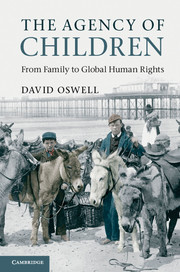Part II - Social theories of children and childhood
Published online by Cambridge University Press: 05 April 2013
Summary
Social theories of children and childhood
In Part II I look at theories of children and childhood initially in the context of modern or classical social and sociological theories and then in terms of (what some may term as) postmodern social and cultural theories.
In Chapter 3 I review debates on social structure and agency. These debates have been central to the recent (from the later 1980s onwards) development of the sociology of childhood. In part, the sociology of childhood has provided analytical and empirical descriptions of childhood as a social structural phenomenon in the sense that all societies, both past and present, might be said to encode a division between adulthood and childhood, such that a division also implies inequalities regarding power and the distribution of capital (of one form or another) and that a relationship of learning or socialisation is needed for the transition of people from one category of personhood to the other. On the other hand, a wealth of empirical studies have considered children as agentic beings, namely as social beings who make a difference to the social worlds around them, whether in terms of their capacity to interpret and make meaning or in terms of their capacity to materially manipulate their environment. Also, research into the sociology of childhood has sought to understand structure and agency, not as mutually exclusive devices for understanding and describing the experiences of children but as two sides of the same coin.
- Type
- Chapter
- Information
- The Agency of ChildrenFrom Family to Global Human Rights, pp. 35 - 36Publisher: Cambridge University PressPrint publication year: 2012



